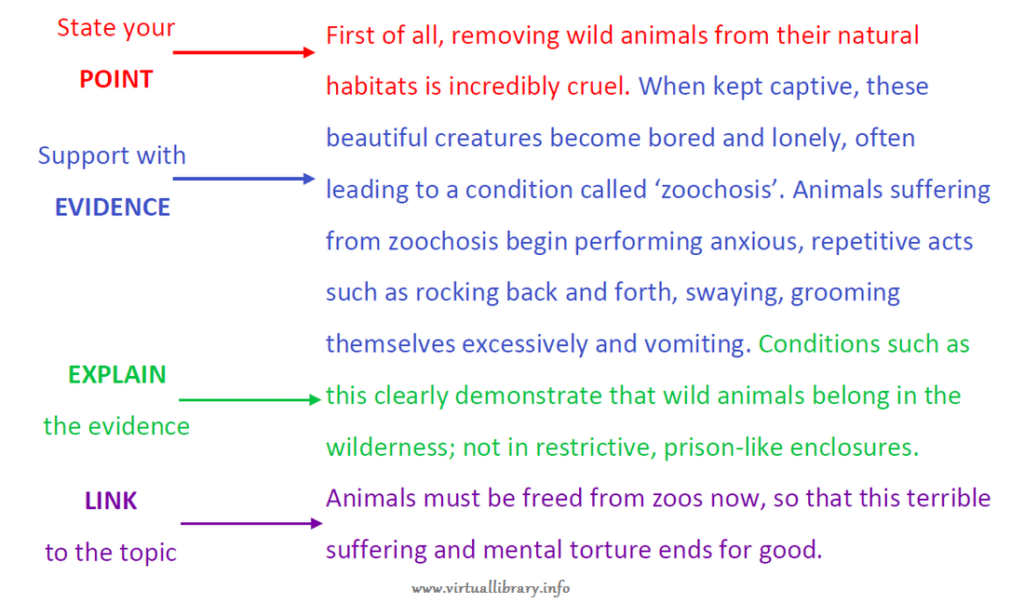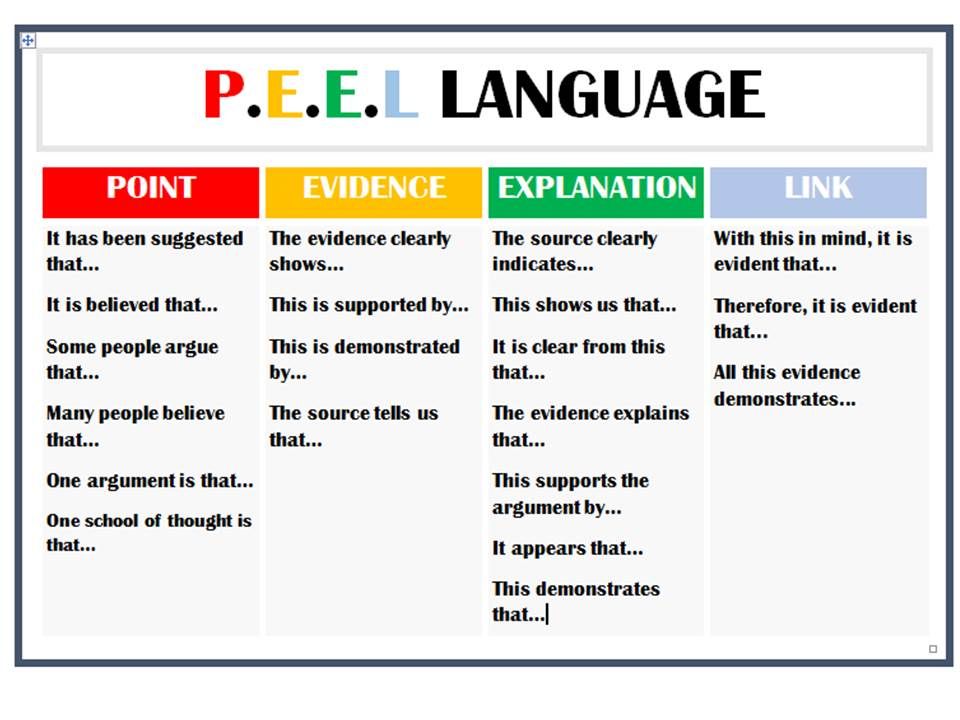1. Analytical Responses
- Analytical Responses in literature exams require you to keep your answers detailed and well-supported. When explaining, provide thorough reasons and analyses for your points.
- It’s not just about stating ideas; you need to delve into the specifics.
- Focus on how the writer’s choice of words creates particular effects in the text. Think about the emotions or images those words evoke and how they contribute to the overall meaning.
- Essentially, you’re dissecting the text, explaining why certain choices were made and the impact they have.
- So, during your literature exams, aim for responses that go beyond surface-level observations, providing in-depth explanations and analyses supported with solid reasons, especially when commenting on the specific effects brought about by the writer’s language choices.
2. PEEL Method
- The PEEL (Point, Evidence, Explaination, Link) method serves as a valuable framework in preparing for literature by enhancing students’ ability to construct clear and well-supported responses.
- The PEEL method, when applied systematically, not only aids in organizing thoughts but also fosters a deeper understanding of the text, refining students’ analytical and writing skills in preparation for the varied challenges presented in the paper.



3. Structural Analysis
- Structural Analysis in the Literature 2010 paper is about dissecting a poem’s organization and understanding the choices made by the poet.
- Begin by exploring how the poem unfolds, examining its beginning, development, and conclusion. Look for patterns and changes in the poet’s approach. Pay attention to shifts in tone and mood—how the feelings change throughout the poem.
- Dive into the effects of imagery, considering how vivid descriptions enhance the reader’s experience.
- Equally important is analyzing rhythm—how the words flow and the pace they set. During your exam, take a systematic approach to understand the structure of the poem. Click here to view a step-by-step process.
- Consider it like unraveling a story, paying attention to the order of ideas, shifts in emotions, and the impact of vivid descriptions and rhythm.
- To view a comprehensive guide on how to do structural analysis, click here.
4. Linking Ideas To Questions
- Linking ideas to the question is a crucial aspect of excelling in your literature exam. It means that every part of your analysis, from the quotations you choose to the language you discuss, should directly connect with the question at hand. Imagine your response as a focused conversation where every word contributes to answering the question.
- Make sure your ideas are not wandering off-topic; instead, they should maintain a direct link to the specific inquiry posed.
- This approach ensures that you’re not just showcasing knowledge but demonstrating its relevance to the task at hand. To view a detailed guide, click here.
- Using conjunctions and connectives are a very effective strategy to create linkages.

- So, when writing your response, keep the question in mind like a guiding star, ensuring that every aspect of your analysis contributes to a clear and focused answer.
5. Building A Strong Answer
- Building a strong answer is like constructing a sturdy structure—each element contributes to its strength.
- Start by incorporating paragraphs that feature relevant quotations, ensuring they align with the essay question. These quotations act as supporting pillars, holding up your analysis.
- Provide clear explanations of the meaning and context of these quotations, offering a foundation for your interpretation.
- Then, elevate your response by analyzing the effects of the poet’s language and structure choices. Link these analyses directly to the question, showcasing how each choice contributes to the overall theme or message.
- Think of it as building layers of understanding, with each part reinforcing the strength of your response.
6. Accuracy and Relevance:
- Accuracy and Relevance are key principles to uphold during your literature exam. Although examiners won’t penalize you for making incorrect statements, aiming for accuracy ensures the reliability of your responses.
- Be meticulous in presenting information, avoiding factual errors whenever possible. Equally important is relevance—every detail you include should directly contribute to answering the question.
- Strive to maintain a strong connection between your response and the text’s core themes, ensuring that your insights align with the specific inquiry.
- By emphasizing accuracy and relevance, you not only present a trustworthy understanding of the text but also showcase your ability to engage thoughtfully with the material, enhancing the overall quality of your literature exam responses.
7. Analyzing Sample Responses
- Practicing with sample responses for Literature 2010 serves as an indispensable guide in honing the skills necessary for success in the exam.
- By closely examining these examples, you gain insights into effective strategies for crafting well-organized and insightful answers.
- The structural organization of sample responses provides a blueprint for constructing coherent introductions, body paragraphs, and conclusions.
- Additionally, the depth of analysis showcased in these samples offers a model for dissecting literary elements with nuance.
- Observing how quotations are seamlessly integrated and how personal insights are expressed within the context of the question equips you with the tools to strike a balance between subjectivity and exam requirements.
- Furthermore, exposure to diverse approaches in interpreting texts fosters critical thinking.
- Overall, the study of sample responses not only builds confidence in constructing well-argued answers but also serves as a foundation for mastering the nuanced art of literary analysis required in the Literature 2010 exam.
- For viewing sample poetry responses, click here
- For viewing sample prose responses, click here.
Conclusion:
Mastering analytical responses in O Level Literature demands a detailed, well-supported approach. Utilizing methods like PEEL, structural analysis, linking ideas, and building strong answers ensures clarity and depth. Accuracy and relevance serve as guiding principles, and analyzing sample responses provides invaluable insights for exam success.
For Part 1 Click here: https://dotandlinelearning.com/blog/exams/o-level-literature-exam-notes-cambridge-guide-part-1/



